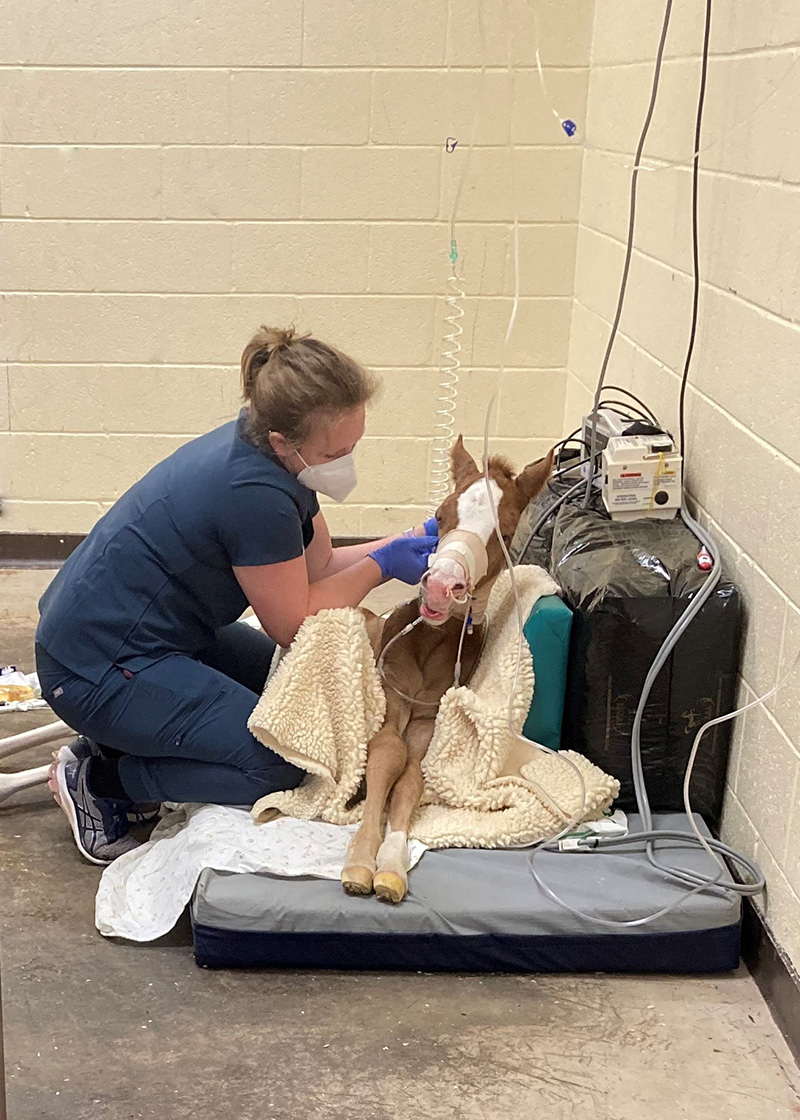Filly foal battles a myriad of medical issues
March 28, 2022

When Quarter Horse Crazy Face and her newborn filly foal Courage, owned by Pleasant Valley Ranch, Knoxville, Maryland, arrived at the Equine Medical Center for emergency evaluation and treatment, the newborn struggled to remain upright and was having difficulty nursing.
Evaluating Courage on the farm, Virginia-Maryland College of Veterinary Medicine alumna Moira Nusbaum from Penmar Equine, Myersville, Maryland, noted her dull mentation and reluctance to stand and referred her to the Equine Medical Center for specialized treatment and 24/7 care.
During the initial evaluation, Krista Estell, clinical assistant professor of equine medicine, noted that Courage’s gums were hyperemic and had a prolonged capillary refill time, indicating dehydration and the early stages of bacterial sepsis. She also had a poor suckle reflex and could not stand independently.
Courage’s clinical signs, physical exam, and bloodwork abnormalities confirmed a hypoxic-ischemic encephalopathy diagnosis - a result of oxygen starvation during the birth process. Unlike other large animals where birth can take hours, foals must exit the birth canal within 20 minutes of the water breaking to avoid brain and organ damage from lack of oxygen.
Courage was placed in one of the Center’s neonatal intensive care foal boxes, where the medicine team could safely handle her while she remained in close proximity to her dam. She underwent aggressive medical management consisting of a constant drip of fluids and dextrose, oxygen supplementation, systemic antibiotics, topical ophthalmic antibiotics, nutritional support, enteral feedings, and gastro protectants. A feeding tube administered colostrum and her milk intake was gradually increased every two hours.

During the first night of hospitalization, concerns over the elevation of Courage’s lactate levels resulted in treatment to stimulate heart muscle contraction and support her blood pressure levels. Her fluid therapy was constantly adjusted to ensure she was adequately hydrated.
The following morning, Courage was much brighter and could stand independently. She was moved into the mare’s section of the stall every two hours to nurse, and she continued to receive nutrition through her feeding tube during this crucial recovery phase. By the end of the day, she was transitioned to intermittent fluid boluses and remained in the stall with her dam, and gradually, over the next few days, her ability to nurse unaided improved.
After five days in the hospital, the filly was bright and comfortable and was nursing independently. Her hydration status was checked frequently, and her blood and urine remained normal. Courage was transitioned to oral antibiotics and remained playful while maintaining normal vital parameters and continuing to nurse well.
After a week in the hospital, Crazy Face and Courage were discharged with precise, comprehensive instructions for continued rehabilitation and aftercare at home.
Pleasant Valley Ranch specializes in breeding racing Quarter Horses, and the Equine Medical Center takes great care of their compromised neonates. Yenizey Yanes shared, “The staff and doctors always work every case with compassion and have the best communication skills, with timely and meaningful updates. We always know that no matter how sick these foals are, we can trust the team to do their best to help them.”



